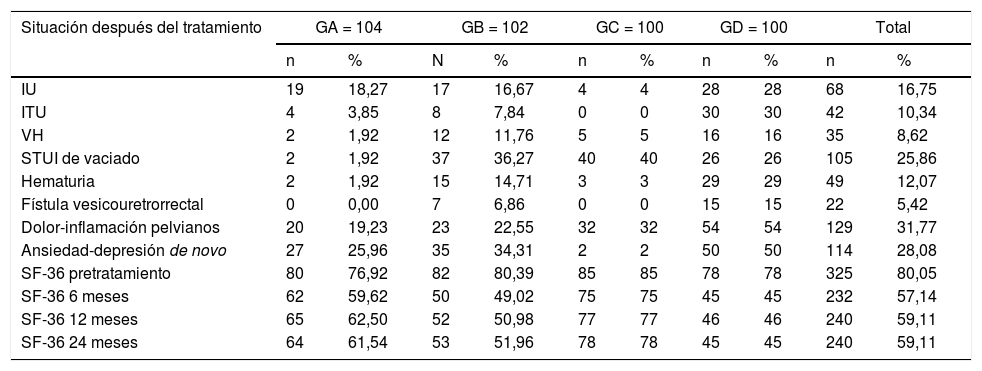El cáncer de próstata (CP) es el segundo cáncer más frecuente del mundo y en los varones. Se estima que la incidencia crezca a 1,7 millones de casos nuevos y 499.000 nuevas muertes en 2030. El tratamiento del cáncer de próstata organoconfinado (CPOC) puede afectar a un individuo tanto física como mentalmente, así como sus relaciones cercanas y su trabajo o vocación, lo cual condiciona la calidad de vida (CV) relacionada con la salud.
ObjetivoConocer el impacto en la CV atribuible al tratamiento del CPOC.
Materiales y métodosEs un estudio observacional multicéntrico de carácter prospectivo de 406 pacientes con CPOC tratados desde enero del año 2015 hasta junio del 2018. La muestra se dividió en cuatro grupos de estudio (GA, GB, GC y GD), correspondientes a los distintos métodos de abordaje quirúrgico: prostatectomía radical (PR), radioterapia externa (RTE), braquiterapia (BT) y diferente a monoterapia con alguno de los otros, respectivamente.
ResultadosLa edad en el GC fue inferior, la media del antígeno prostático específico (PSA, prostatic specific antigen) de todos los pacientes fue 8,13 ng/ml, el grupo de mayor media de PSA fue el GB con 10,43 ng/dL, la media del estadio tumoral (TNM,) fue 3,82, la CV postratamiento en GD fue inferior respecto a los demás grupos.
ConclusiónEl tratamiento del CPOC afecta la CV La monoterapia curativa, concretamente la PR y la BT, afectan menos a la CV que la radioterapia externa u otras alternativas terapéuticas. La incontinencia urinaria y las fístulas secundarias al tratamiento del CPOC son las que producen más deterioro en la CV. El cuestionario SF 36 validado internacionalmente es una medida transversal de la CV, útil para comparar el impacto de los tratamientos del CPOC.
Prostate cancer (PCa) is the second most common male cancer in the world. Its incidence is estimated to grow to 1.7 million new cases and 499,000 new deaths by 2030. Treatment of OCPC can affect patients physically and mentally, as well as their close relationships and their job or career, which conditions health-related quality of life (QoL).
ObjectiveEvaluate the impact on QoL attributable to the treatment for Organ Confined Prostate Cancer (OCPC).
Materials and methodsProspective multicenter observational study of 406 patients with OCPC treated from January 2015 to June 2018. The sample was divided into four study groups, according to the type of treatment: radical prostatectomy (RP) (GA), external radiotherapy (ERT) (GB), brachytherapy (BT) (GC) and other treatments different from monotherapy with RP, ERT or BT (GD).
ResultsThe age in GC was lower, the mean Prostate Specific Antigen (PSA) of all patients was 8.13 ng/ml, the group with the highest mean PSA was GB with a mean of 10.43 ng/dL, the mean Tumor Stage (TNM) was 3.82, and GD had the lowest post treatment quality of life.
ConclusionOCPC treatment affects QoL. Curative monotherapies, specifically RP and BT, have less effect on QoL than external radiotherapy or other therapeutic alternatives. Urinary incontinence and fistulas secondary to OCPC have the highest impact on QOL impairment. The internationally validated SF 36 questionnaire is a useful cross-sectional measure of QOL to compare the impact of OCPC treatment modalities.

















